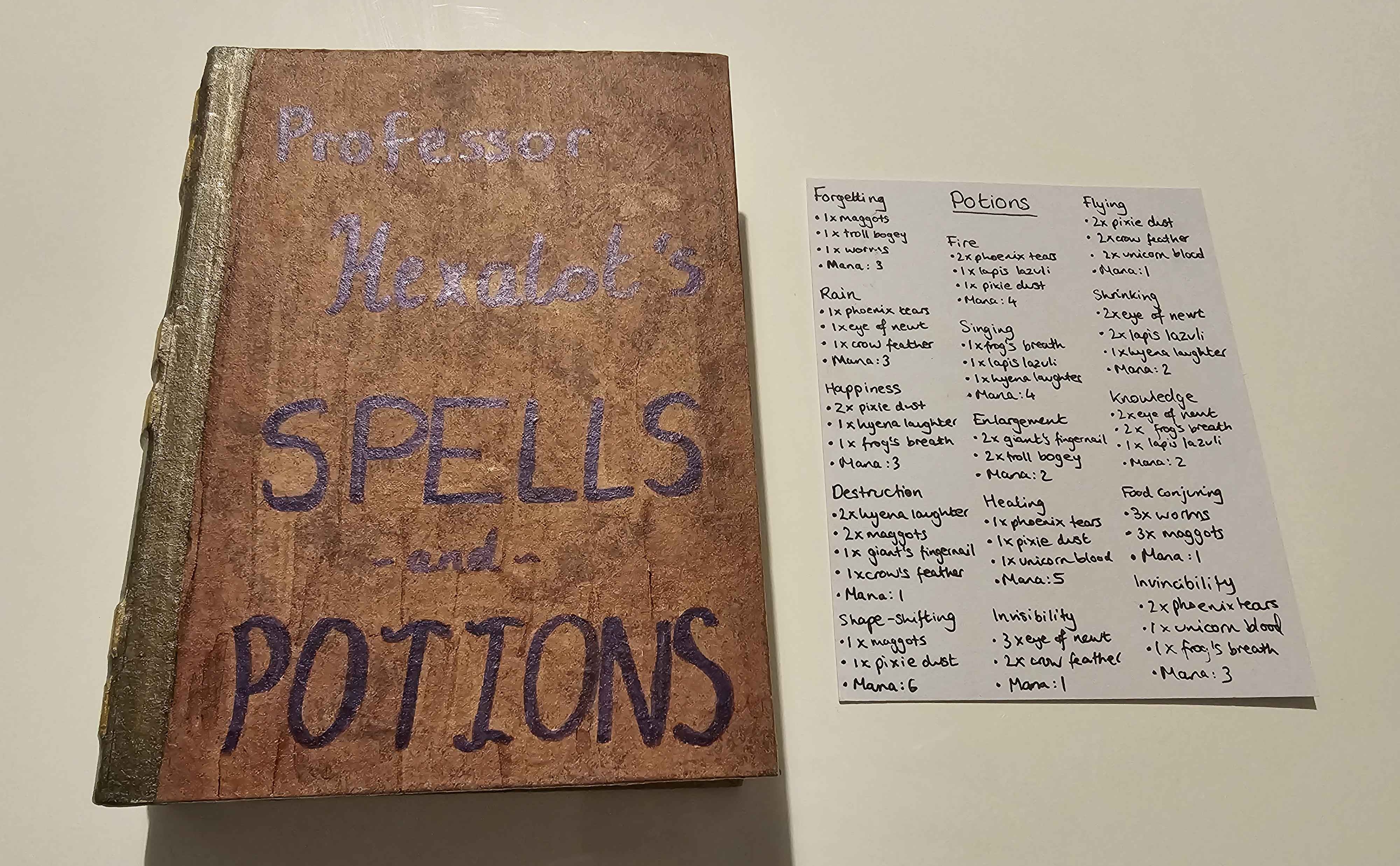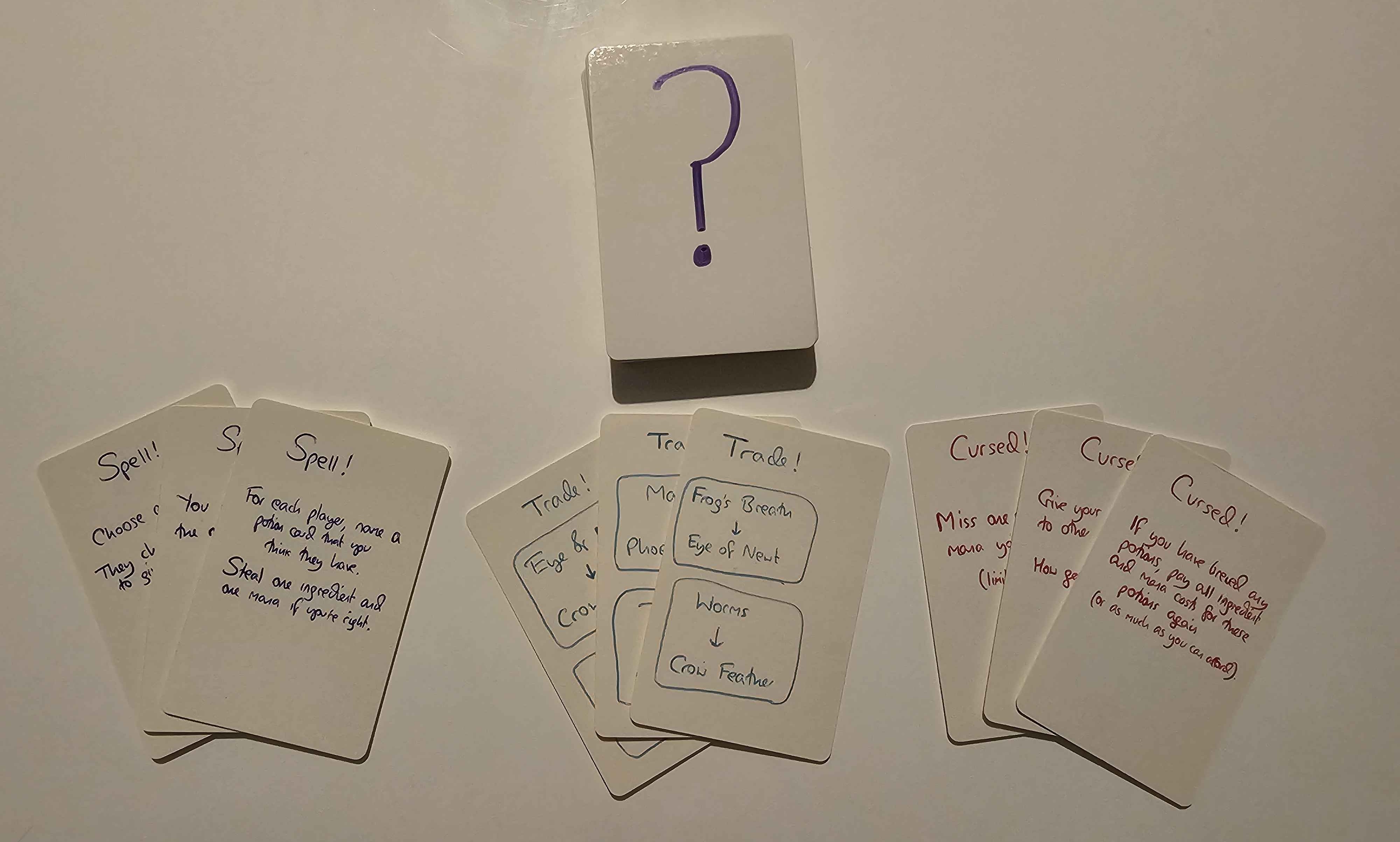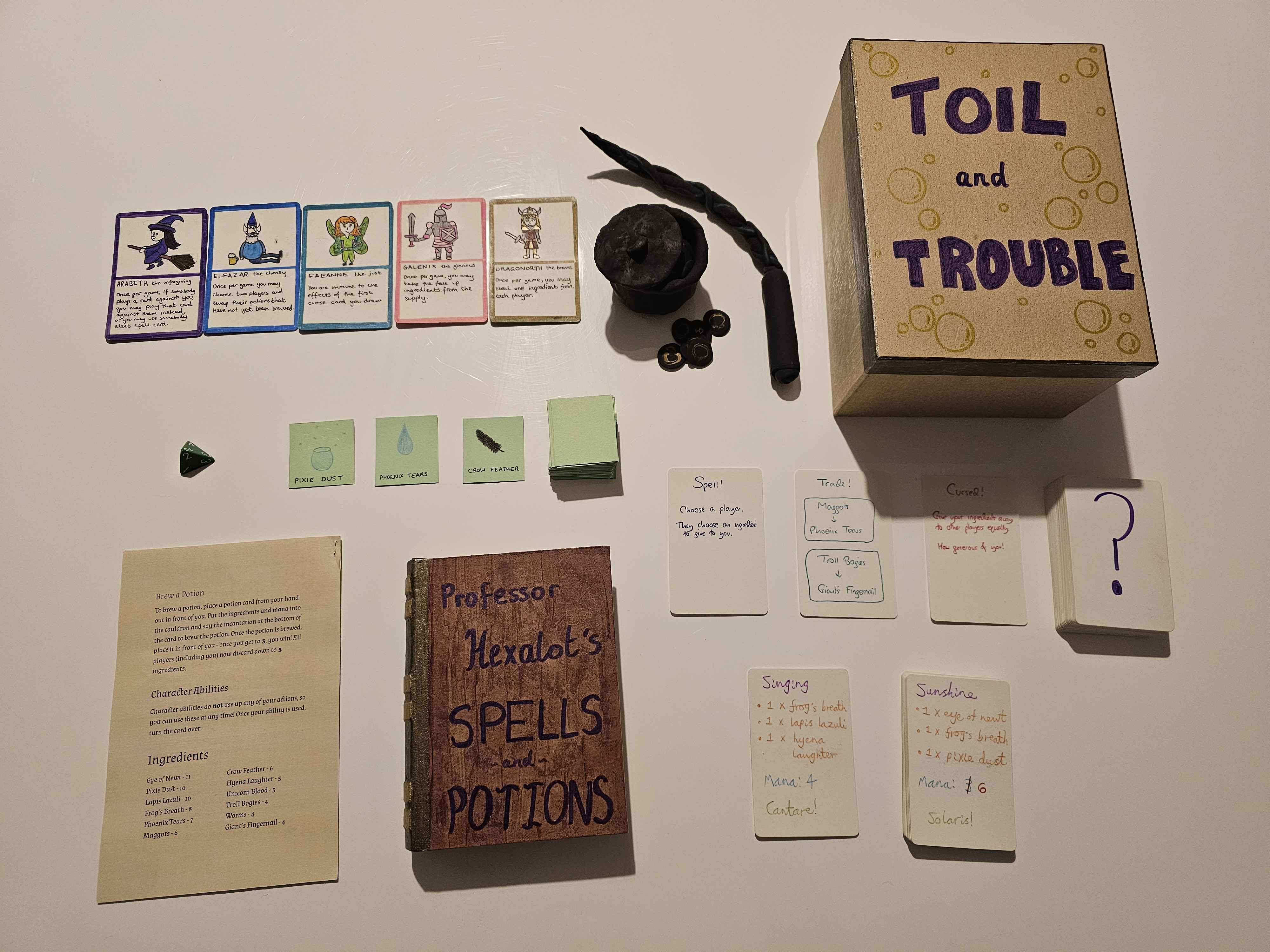License
This game is released to the public domain. This means you can make your own version to play at home, or print copies of this game commercially. Some credit would be lovely, but you have no legal obligation to do so.
Context
Toil and Trouble was created for the Warwick Game Design x Warwick Tabletop Board Games Jam 2024. The theme for the jam was "Taking Chances". On the team was:
- Josh Humphriss (me).
- Alice George.
- Sarah Smith.
I focused on developing the mechanics. I didn't do any of the art.
Introduction
You are magical beings attending Professor Hexalot's school of witchcraft. In order to pass potions class, you need to brew 3 potions. You'll do this by gathering ingredients, mana, and taking chances on the mystery cards to cast spells and unlock new trade opportunities, but hopefully not get cursed!
The rulebook will tell you everything you need to know to get started. The rest of this article will focus in on some of the mechanics, but the rulebook is the best place to go for a quick introduction to the game.
Download the RulebookThe game is designed for 2 to 5 players.

Ingredients
The biggest part of the game is collecting the right ingredients you need to brew potions. The game has an open draw mechanic where there are always 3 face-up ingredients, which works really well to add some strategy as players can time when they go for ingredients depending on what is face-up. There's also lots of spell cards that interact with the placed ingredients. A weakness of this is that sometimes it is frustrating that you get unlucky and just can't get a particular ingredient that you need.

Mana
Mana is required to brew potions, but can also be used to swap out potion cards. The mana cost exists as an extra thing to do - best timed when the ingredients aren't looking great or there isn't anything else to do. It's also a key balancing factor in the potion costs - potions that require more/rarer ingredients generally have a lower mana cost to brew. While mana can be a very frustrating mechanic (like eggs in wingspan - always missing when you need them!) it feels very important to provide an extra element to the game and slow down the brewing of potions.

Brewing Potions
Potions require ingredients and mana to brew. In addition, the player must put all of the ingredients and mana into the cauldron and say the incantation at the bottom of the card. Although this doesn't contribute anything mechanically, it makes it feel much more special to brew a potion. A key mechanic is that brewing a potion forces all other players to immediately discard down to five ingredients (of their choice) - preventing players from hoarding ingredients and providing an incentive to brew early! This was a really successful mechanic.

Mystery Cards
Some players may use mystery cards a lot, while others may never use them. They often provide very useful spells and trade opportunities, although occasionally they can be a curse!
Spells
Spells are unique one-time abilities that you keep in your hand until you want to use them. Some are better than others, but all of them are useful. Example spells:
- Choose a player. They choose an ingredient to give to you.
- The next potion you brew costs 0 mana.
- On your next turn, when brewing a potion, trade one ingredient for any other.
- For each player, name a potion card that you think they have. Steal one ingredient and one mana if you're right.
- All players pass their character cards one space. You choose which direction.
- You are safe from the next curse you draw.
Some of the spells ask you to guess what potions other players have. This rewards observant players that notice what ingredients people are aiming for and can predict what they're aiming to brew.
Trades
Trades are a very important mechanic, and form the backbone of a mystery card driven strategy. Each card unlocks two trades which are placed face up in front of you and free to use as many times as you like for the rest of the game. While a few trades isn't that useful, if you get lots, you can start to chain them together and convert any ingredient you see into something you need! Linking together lots of trades is really fun, and makes this a great mechanic.
Curses
Curses can have no effect, but they can be absolutely devastating. Some will particularly punish players early on in the game, most will punish players that are closer to winning. Example curses:
- You may not brew potions for 5 turns.
- Choose a potion you have brewed. It returns to your hand.
- If you have brewed any potions, pay all ingredient and mana costs for these potions again (or as much as you can afford).
- Give your ingredients to other players equally. How generous of you!
- Reveal your potions to all players. A majority vote decides which one you discard. Draw a replacement potion card.
- The player to your left chooses an ingredient. Replace all your ingredients with this ingredient.
Overall, the curses are rare enough to be surprising when they happen and serve their purpose well of making it a little bit risky to take mystery cards, but not too risky. Most of them have an effect that will only set you back a few turns, and won't put people off taking a chance.

Character Abilities
The character abilities are just one little extra thing to make it a tiny bit more interesting. They only trigger once per game, and don't have a huge impact on the game but it gives each player an extra thing to think about - when they're going to use their ability. Note that they do not have to be used on your own turn.
| Galenix | Once per game, you may take the face up ingredients from the supply, and the top 3 ingredients from the discard pile. |
| Dragonorth | Once per game, you may steal one ingredient from each player. |
| Arabeth | If another player players a spell card, you may play it instead. |
| Faeanne | You are immune to the effects of the first curse card you draw. |
| Elfazar | Once per game, choose 2 players: swap their potions that have not yet brewed. (If the number of potion cards differs, swap the minimum number that leads everyone to finish with the same number of potion cards. The player with the most potions chooses which ones to swap). |
These are all unique abilities that are quite balanced, and feel just impactful enough to use, but not too impactful to derail the whole game. Elfazar causes chaos, Faeanne is defensive, Galenix gets loads of ingredients, Dragonorth gets fewer but steals them and gets to choose which, and Arabeth can be both defensive and offensive.








